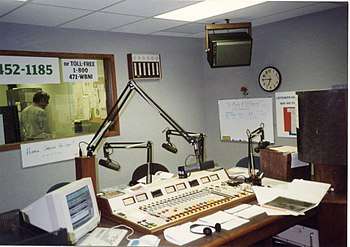Radio producer
A radio producer oversees the making of a radio show. The job title covers several different job descriptions:
- Content producers or executive producers oversee and orchestrate a radio show or feature. The content producer might organize music choices, guests and callers for a talk radio show or competitions, timings and overall show content.[1]
- Creative producers, imaging specialists or imaging producers ("Imaging" in the radio business relates to brand management rather than visual material) produce audio content for the show, such as sound clips used on the show and "promo clips" (radio commercials and commercial bumpers used on the same station to promote the show). [2]
- The board operator or technical operator operates the technical controls—such as sound volume levels, recording software and switchboard. The producer can be in a separate control room separated from the radio studio by a window, which allowed visual contact while blocking noise. With quieter switches and better directional microphones, the producer and the controls may be at the same table as the on-air talent (as shown here) without adding unwanted sound to the product.

In this studio from radio station WBNI, the producer sits in the foreground and operates the mixing console, while the on-air performers sit across the table and speak into the microphones.
Many radio stations and radio networks have a production director who oversees the above responsibilities. This individual or a production staff, may do the production work for many shows or many stations.
Notes
- Stewart, Peter (2015), Essential radio skills : how to present and produce a radio show (Secondedition ed.), London Bloomsbury Methuen Drama, ISBN 978-1-4081-2179-5
- Connelly, Donald W (2017), Digital radio production (Third ed.), Waveland Press, Inc, ISBN 978-1-4786-3418-8
Further reading
- McLeish, Robert (2005), Radio production (5th ed.), Focal Press, ISBN 978-0-240-51972-2
- Keith, Michael C (1990), Radio production : art and science, Focal Press, ISBN 978-0-240-80017-2
gollark: VP9 did work and encoding happened at not *unusably* awful speeds (0.25x).
gollark: I tried compiling AV1 encoders for some reason (I think seeing how ridiculously small I could make some videos without terrible quality?) but one of the things I couldn't get working and the others were either bad somehow or horribly slow.
gollark: Kind of bad performance generally, though.
gollark: Entirely reasonable! They have built-in UPSes and screens/keyboards for monitoring.
gollark: There was a message above what I said, but they deleted it.
External links
- Radio Producer (creativeskillset.org)
This article is issued from Wikipedia. The text is licensed under Creative Commons - Attribution - Sharealike. Additional terms may apply for the media files.